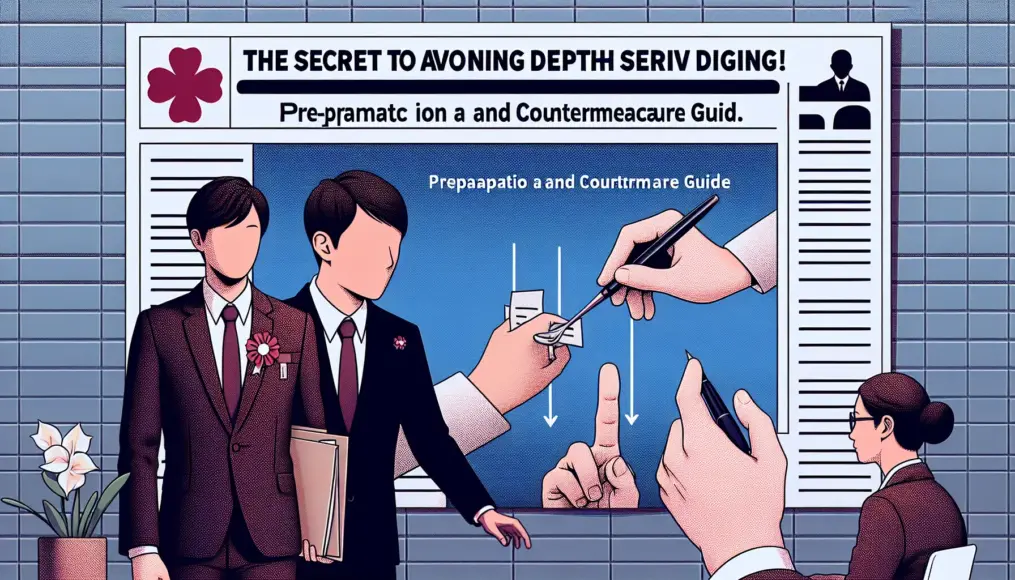Are you feeling anxious about deep-dive questions during your public service interview? You’re not alone—many candidates share this concern.
When interviewers ramp up the intensity of their questions, it can be challenging to know how to respond. However, with the right preparation, you can equip yourself with strategies to avoid getting drilled too deeply.
By conducting thorough self-analysis and selecting the right anecdotes, you can help the interview flow more smoothly.
- Understand the characteristics of public service interviews and common questions
- The importance of preparation to avoid deep-dive inquiries
- Mastering precise responses during the interview
Taking the time to prepare can significantly enhance your confidence and performance in the interview room.
Characteristics of Civil Service Interviews and Common Questions
Civil service interviews have a unique structure and set of characteristics that set them apart from other job interviews.
To avoid being probed too deeply, it’s crucial to have a solid understanding of the basics of the interview process.
In this section, we’ll take a closer look at the flow of civil service interviews and some frequently asked questions.
Basic Flow of Civil Service Interviews
The interview typically begins with a self-introduction.
Following that, you’ll encounter questions about your motivations for applying and your self-promotion, which may lead to more in-depth inquiries.
This highlights the importance of thorough preparation.
Interviewers will ask questions to understand your thoughts and values, so it’s essential to communicate your opinions clearly.
- Starts with a self-introduction, followed by questions about your motivations and self-promotion.
- Understanding the intent behind the questions and preparing well is crucial.
- It’s important to convey your opinions clearly and accurately.
Common Questions and Their Intent
In civil service interviews, certain questions are frequently asked.
For instance, the question “Why do you want to become a civil servant?” is aimed at understanding your motivations.
Similarly, “What are your strengths?” is designed to assess your self-awareness and ability to promote yourself.
By answering these questions effectively, you can minimize the chances of being probed further.
Interviewers may follow up with additional questions based on your responses, so it’s a good idea to organize your personal anecdotes in advance.
Sometimes, you’ll also need to demonstrate your resilience under stress during the interview. For specific examples of questions and effective response techniques, check out How to Demonstrate Stress Resilience in Interviews: A Comprehensive Guide.
- The question “Why do you want to become a civil servant?” seeks to uncover your motivations.
- “What are your strengths?” tests your self-awareness.
- It’s important to organize your anecdotes to avoid in-depth probing.
Preparing to Avoid Probing Questions in Your Public Service Interview
In public service interviews, candidates often find themselves facing deep probing questions.
That’s why thorough preparation is key.
By understanding how to conduct a solid self-analysis and select the right experiences to share, you can navigate your interview smoothly.
The Importance of Self-Analysis
Engaging in self-analysis helps you identify your strengths and weaknesses.
During a public service interview, interviewers are eager to understand your personality and thought process.
Thus, knowing yourself well is the first step to avoid being probed too deeply.
Having specific experiences to draw upon will allow you to answer questions confidently.
Let’s prepare to convey your unique charm to the interviewers through your self-analysis.
- You can gain insight into your strengths and weaknesses.
- Interviewers want to understand your character.
- Having specific experiences makes it easier to respond with confidence.
How to Choose Effective Experiences
The experiences you choose to share are crucial in conveying your accomplishments and growth.
First, it’s essential to clarify what challenges you faced and what the outcomes were.
Additionally, the experiences you share should ideally reflect the qualities and values of a public servant.
By showcasing concrete results, you can leave a strong impression on the interviewers.
Having effective stories at your disposal allows you to present yourself well and avoid being probed further.
- Clearly communicating your experiences and achievements is vital.
- Aim for experiences that showcase your public service qualities and values.
- Demonstrating tangible results creates a lasting impression.
How to Handle Interview Questions and Avoid Being Probed Deeper
During public servant interviews, it’s crucial to provide accurate responses to the questions asked.
To avoid being probed for more details, having effective communication strategies is essential.
In this section, we’ll delve into how to respond to questions and how to incorporate specific examples effectively.
Responding Accurately to Interview Questions
When faced with questions from the interviewer, it’s important to answer them accurately.
First and foremost, understanding the intent behind the question is key.
For instance, when asked, “What are your strengths?” it’s beneficial to articulate your unique qualities clearly and explain how those strengths would be advantageous in a public service role.
Additionally, summarizing the information the interviewer seeks concisely can help reduce the likelihood of being asked follow-up questions.
Practicing how to communicate your thoughts clearly can also be quite effective.
- Understanding the intent of the question is essential
- Clearly state your unique qualities
- Summarize the information the interviewer is looking for concisely
Tips for Using Specific Examples in Your Answers
Utilizing specific examples can leave a strong impression on the interviewer.
For example, when discussing a “successful experience in a team,” it’s important to clarify the situation, your role, and the outcome.
By weaving in concrete anecdotes, you can make it less likely for the interviewer to dig deeper.
Moreover, if the anecdotes demonstrate your suitability for the public service, they become even more impactful.
Using specific examples allows you to convey your strengths and values, making it easier for the interviewer to understand your perspective.
- Using specific examples creates a strong impression
- Clarify the situation, your role, and the outcome
- Ensure your anecdotes showcase your suitability for public service
Reflecting on Your Interview and Identifying Areas for Improvement
After completing a public service interview, taking the time to reflect is crucial.
Through this reflection, you can discover ways to enhance your responses and overall approach.
Conducting a self-assessment and utilizing feedback will serve as essential steps in preparing for your next interview.
The Importance of Self-Assessment After the Interview
Once the interview is over, it’s important to evaluate your responses and demeanor.
Think specifically about what went well and which areas could use improvement.
In particular, reflecting on your answers to probing questions will help you strategize for the next time.
Self-assessment contributes to your personal growth, so it’s vital to approach it seriously.
- Reflect on your responses and attitude
- Consider both strengths and areas needing improvement
- Reviewing answers to probing questions will help you strategize for the next interview
Utilizing Feedback for Future Improvement
Receiving feedback from others after the interview is also essential.
For instance, ask friends or family to observe your interview and share their thoughts.
Specific advice from them can reveal improvement areas you might not have noticed yourself.
By incorporating this feedback into your preparations for the next interview, you’ll be able to approach it with greater confidence.
- It’s important to gather feedback from others
- Ask friends or family to observe your interview
- Use specific advice to identify areas for improvement
Conclusion
When it comes to acing public service interviews, thorough preparation is key.
By conducting a deep self-analysis and selecting impactful stories to share, you’ll be able to answer interviewers’ questions with confidence.
Additionally, reflecting on your performance after the interview and utilizing feedback are crucial steps for improvement in future interviews.
- Understand your strengths through self-analysis
- Answer questions with specific examples
- Reflect on your performance afterward to improve next time
The outcome of your public service interview can vary significantly based on your preparation.
We encourage you to use this article as a guide to enhance your interview readiness.
If you have any comments or questions, feel free to reach out!



Comment